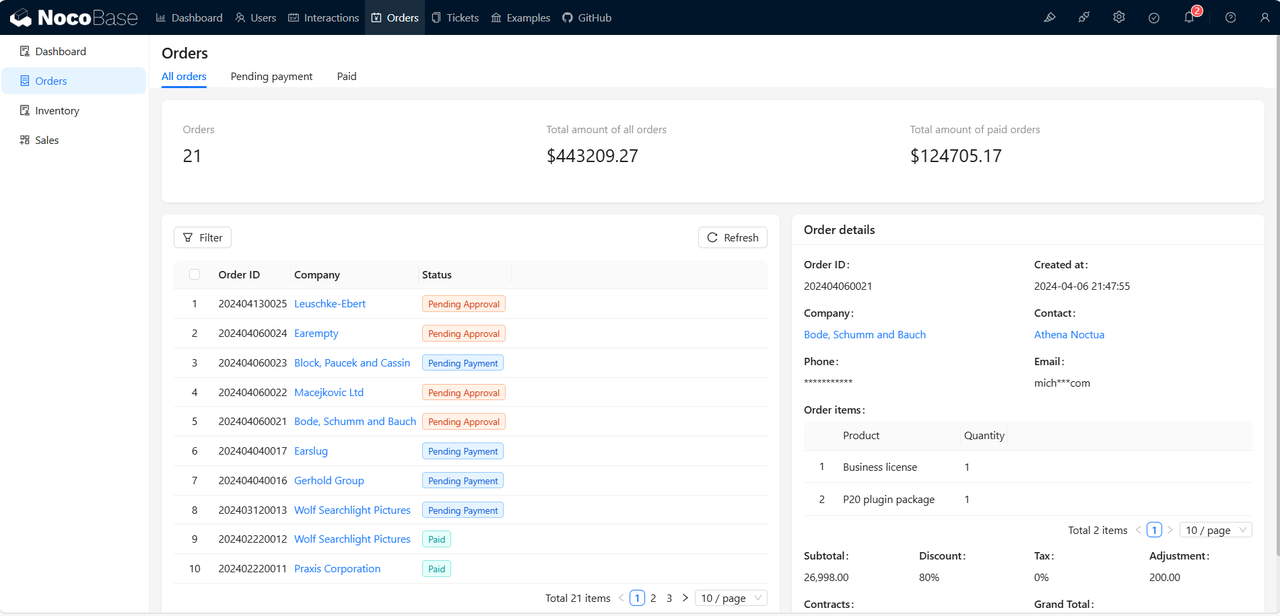Managing inventory in a small business can be a time-consuming and complex task. Whether it’s scattered inventory data, frequent human errors, or the challenges of coordinating across multiple platforms, these issues can disrupt business operations.
To help small businesses overcome these challenges, this article introduces six different inventory management tools that can efficiently solve the following key problems:
- How to synchronize inventory across multiple warehouses in real time?
- How to automate restocking and reduce manual intervention?
- How can developers extend system functionality to meet business needs?
- Can non-technical users configure and manage inventory rules with ease?
Golden Criteria for Choosing an Inventory Management Tool:
✔️ Easy to Use in 30 Minutes – The tool should be user-friendly, even for those with limited technical skills.
✔️ Scalable Multi-Platform Integration – Seamless integration with other systems (e.g., accounting, CRM) and flexible expansion options as the business grows.
✔️ Transparent Pricing – No hidden or unexpected fees.
✔️ Full Mobile Functionality – Inventory management on the go to meet modern mobile work needs.
Top 6 Inventory Management Tools for Small Businesses
1. NocoBase - Open-Source No-Code/Low-Code Platform
Key Features
- No-Code/Low-Code Development – No programming skills required. Users can configure complex inventory workflows through a visual interface, including inventory classification, data entry, and process automation. NocoBase provides detailed documentation, tutorials, and community support to help users optimize their experience.
- Data Model-Driven – The separation of data models and UI allows users to design custom inventory management interfaces for different roles and scenarios without changing the underlying data structure.
- Modular Plugin Architecture – Every feature in NocoBase is a plugin, meaning users can install, remove, or develop inventory-related plugins based on their business needs, enabling highly flexible system expansion.
Best Use Cases
NocoBase is ideal for small businesses that need flexible inventory management for multiple warehouses, complex workflows, and cross-department collaboration. By leveraging its no-code/low-code design, businesses can easily build a fully customized inventory management system.
For example, a cross-border e-commerce company can use NocoBase to synchronize inventory across multiple warehouses in real time, update stock information instantly, and automate restocking based on demand. Businesses that frequently adjust inventory workflows or need rapid market adaptation will benefit from its highly customizable and scalable features.
Price
2. Zoho Inventory
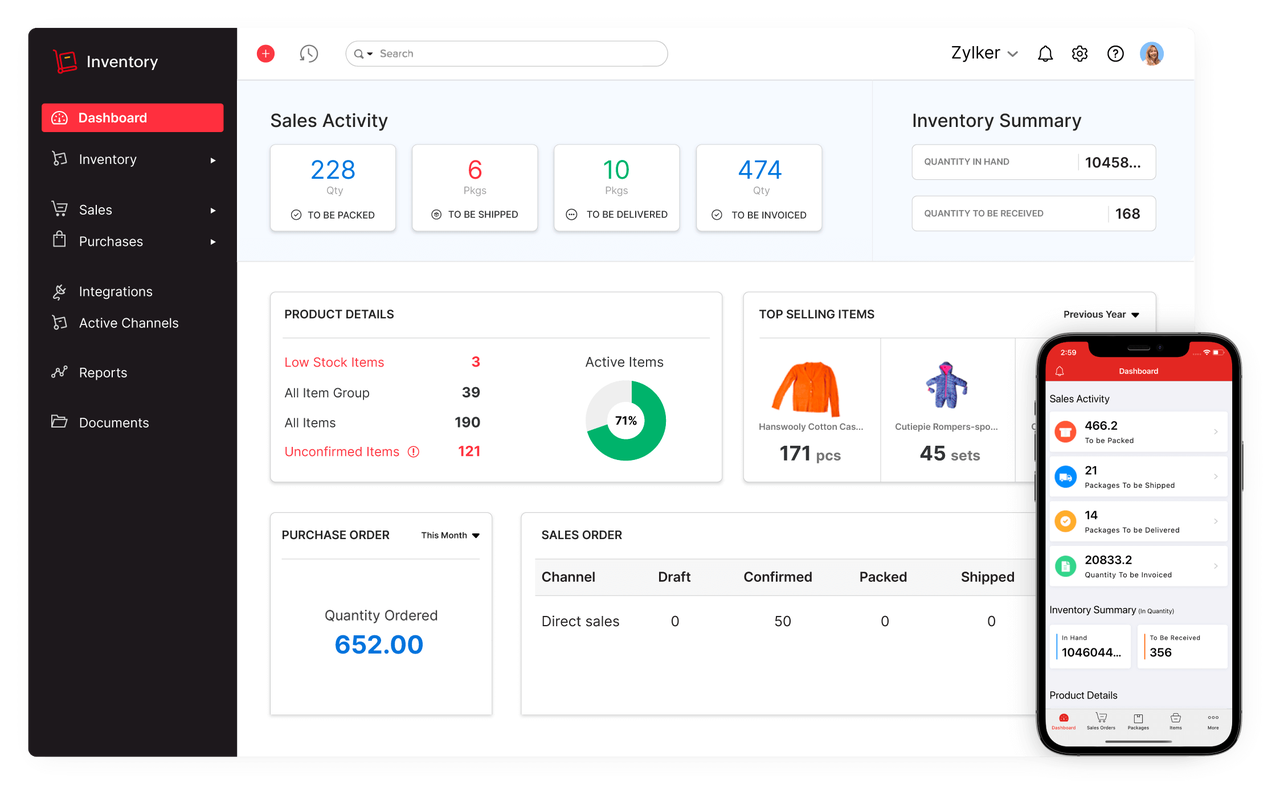
Key Features
- Multi-Channel Sales Integration – Seamlessly integrates with major e-commerce platforms such as Amazon, eBay, Etsy, and Shopify, allowing businesses to expand online sales quickly.
- Comprehensive Order Management – Manages both offline and online orders in one place, supporting purchase orders, backorders, and drop shipping for efficient fulfillment.
- End-to-End Inventory Tracking – Offers serial number and batch tracking, providing real-time stock monitoring and expiration management to reduce losses.
Best Use Cases
Zoho Inventory is perfect for businesses already using Zoho tools (e.g., Zoho CRM, Zoho Books) and those needing automation for inventory workflows and multi-channel sales.
For example, a small retailer selling on multiple platforms can use Zoho Inventory to automatically sync stock levels and prevent overselling. By integrating with Zoho CRM and Zoho Books, businesses can streamline their workflow from customer management to financial reconciliation.
Price

3. Odoo Inventory
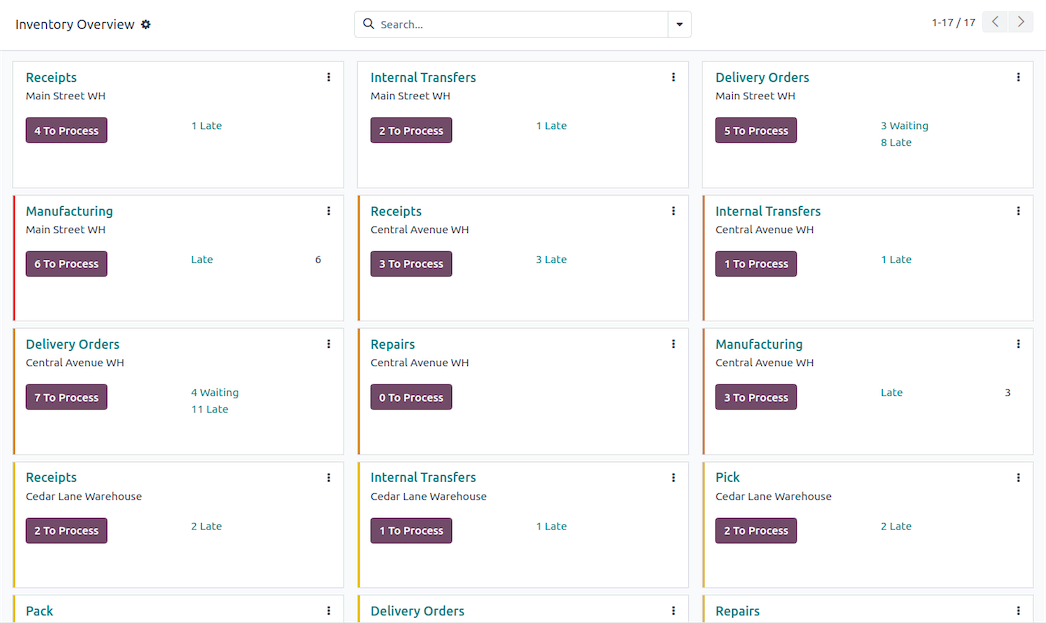
Key Features
- Smart Restocking & Automation – Implements various restocking strategies, automatically triggering purchase orders to optimize inventory levels and reduce stockouts.
- Efficient Warehouse & Logistics Management – Supports inbound, storage, and outbound operations with multiple picking strategies and offline compatibility for seamless warehouse optimization.
- Real-Time Inventory Control & Analytics – Offers real-time stock tracking, advanced valuation methods, and intelligent routing for informed decision-making.
Best Use Cases
Odoo Inventory is ideal for small businesses needing a highly customizable inventory management system, especially in industries like manufacturing, wholesale, and distribution.
For instance, a mid-sized manufacturer can track raw materials and finished goods in real time, ensuring continuous production while optimizing stock levels to minimize waste. Odoo’s customization capabilities also allow businesses to tailor inventory workflows to meet unique operational needs.
Price: The Community Edition is free, but some advanced features and enterprise services require additional payment.
4. inFlow Inventory
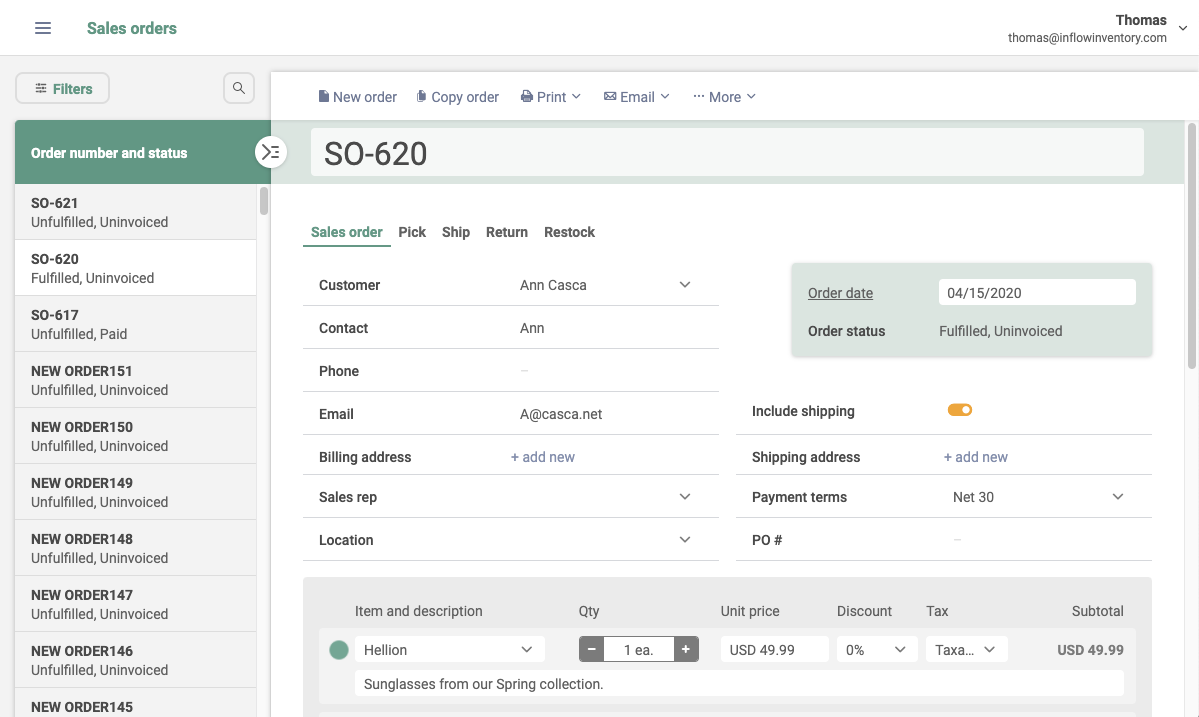
Key Features
- Integrated Order & Inventory Management – Combines order processing with inventory tracking, offering order prioritization, SKU grouping, and workflow automation.
- Multi-Location Inventory Tracking & Alerts – Supports barcode scanning for accurate stock tracking and low-inventory alerts to prevent stockouts.
- Barcode & B2B Sales Optimization – Includes barcode generation, printing, and scanning features, along with a showroom function for streamlined B2B transactions.
Best Use Cases
inFlow Inventory is ideal for small businesses looking for a simple, easy-to-use inventory management solution, particularly those prioritizing local deployment.
For example, a retail store or warehouse-based business can use inFlow Inventory with barcode scanners to simplify inventory entry, tracking, and fulfillment. For businesses without complex integration needs, inFlow offers a straightforward yet powerful solution.
Price
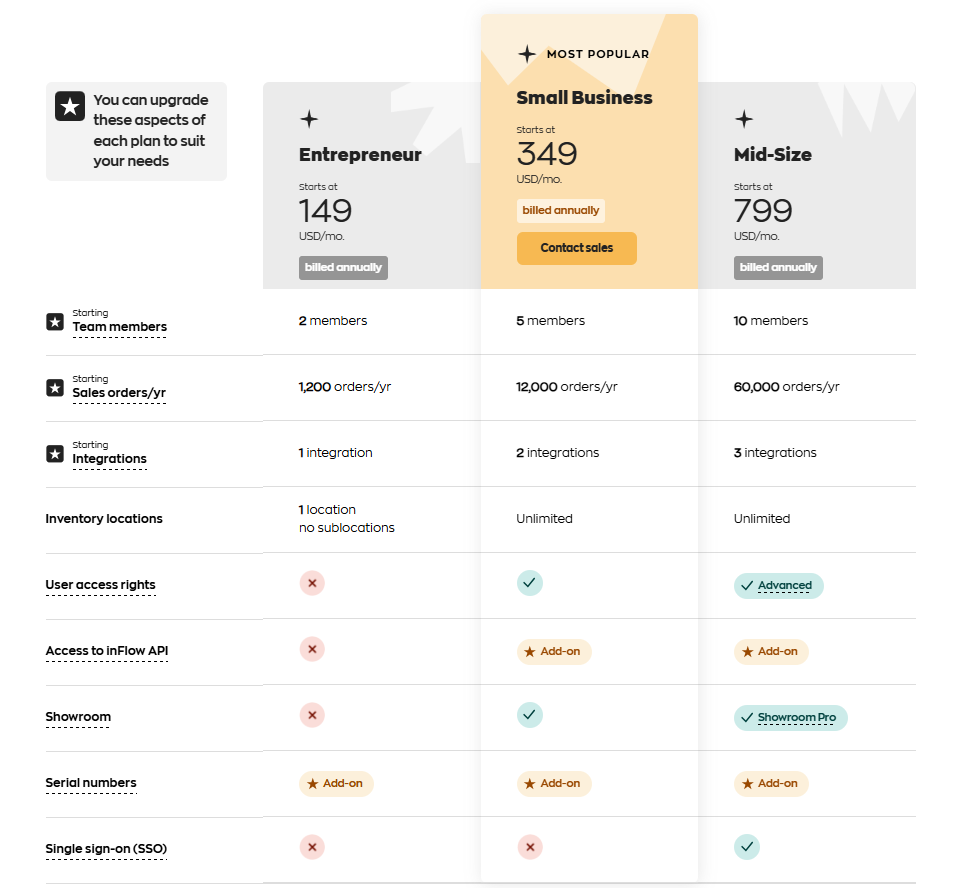
5. Cin7 Core
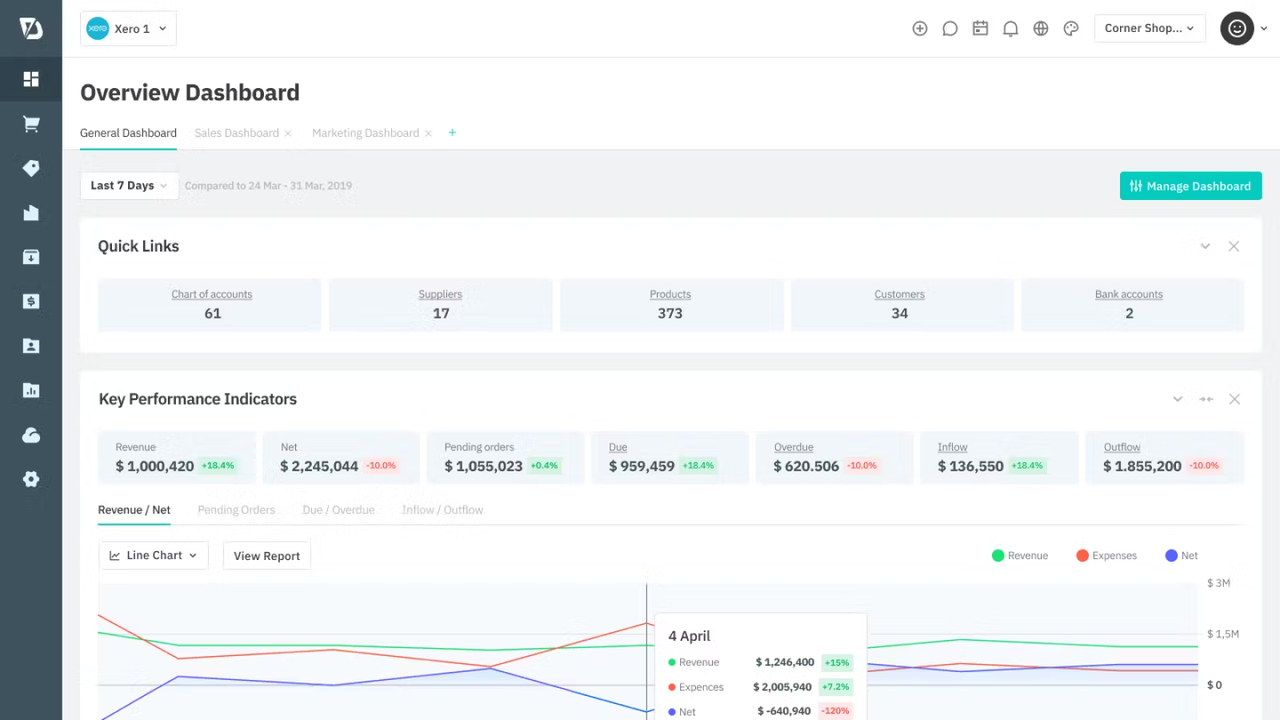
Key Features
- AI-Powered Inventory Forecasting – Uses Cin7 ForesightAI to predict demand, optimize ordering, and reduce stockouts or overstocking.
- Extensive Integration Options – Supports 700+ integrations, including Shopify, Amazon, and other major platforms, ensuring seamless cross-platform inventory management.
- Industry-Specific Solutions – Provides specialized tools for different industries, helping businesses manage orders and fulfillment efficiently.
Best Use Cases
Cin7 Core is best suited for small to mid-sized businesses in manufacturing and distribution that require advanced inventory forecasting and multi-warehouse management.
For example, a manufacturer can use Cin7 Core’s forecasting tools to anticipate inventory demand across warehouses and dynamically adjust supply chain strategies to improve efficiency and cost-effectiveness.
Price
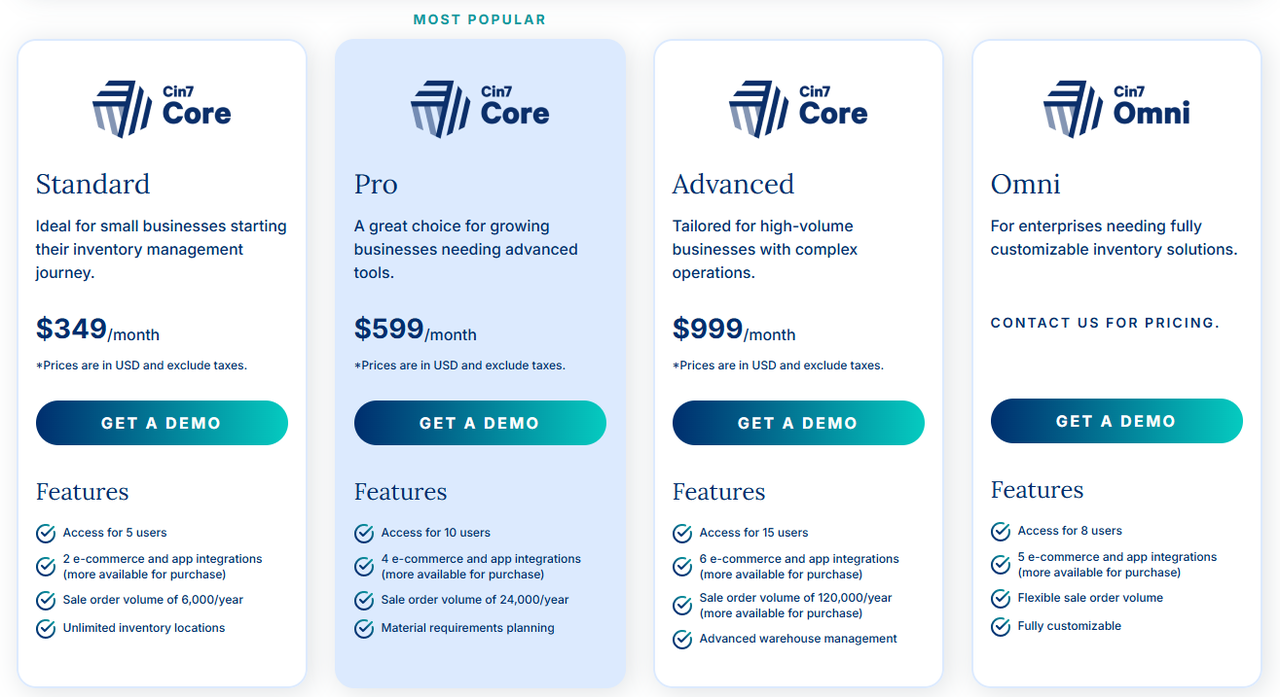
6. Ordoro
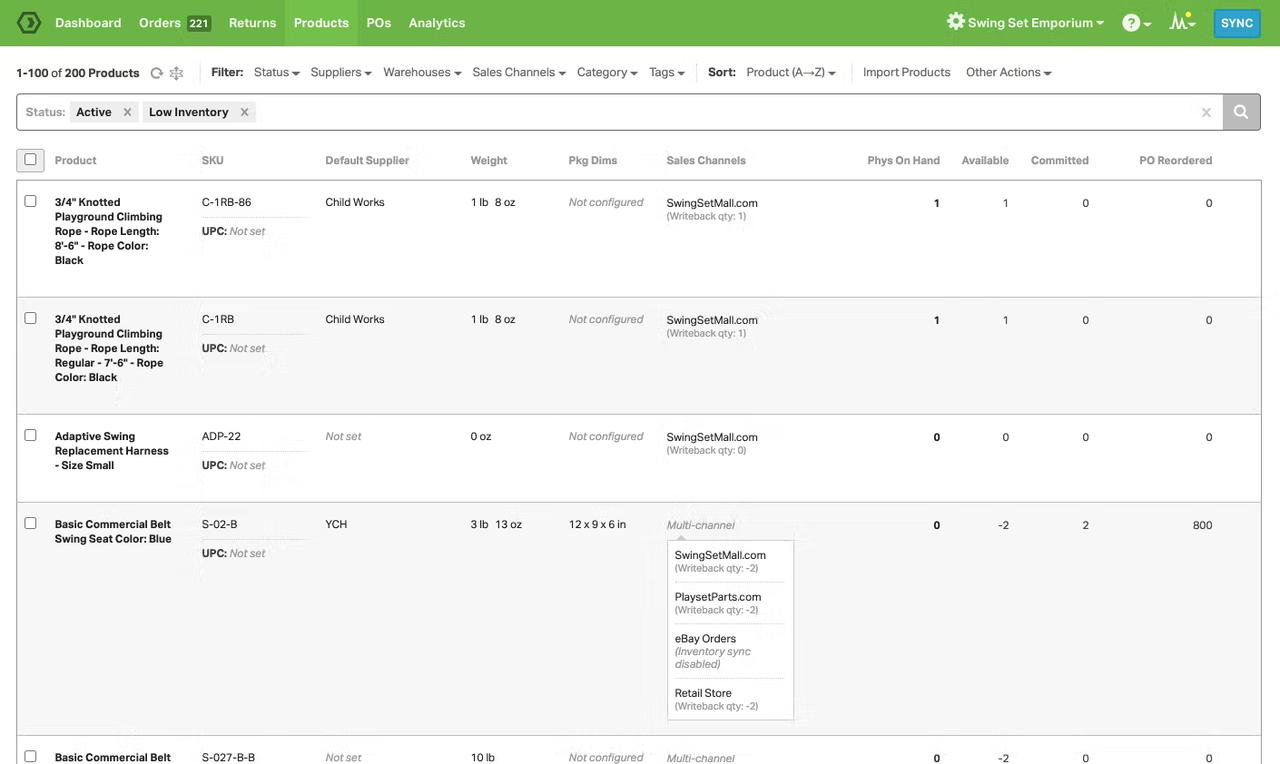
Key Features
- Smart Inventory Synchronization & Optimization – Offers automated stock synchronization, low-inventory alerts, purchase order management, and bundling/kitting options for improved inventory control.
- Powerful Integrations – Provides an open API for seamless system integrations, supports multi-warehouse management, and includes 3PL (third-party logistics) order processing capabilities.
- Automation for Increased Productivity – Features include automated inventory updates, bulk stock uploads, order routing, order splitting, and auto-tagging for streamlined operations.
Best Use Cases
Ordoro is ideal for e-commerce businesses managing inventory across multiple platforms. It allows seamless third-party logistics integration to enhance inventory control and shipping efficiency.
For instance, a global e-commerce business can use Ordoro to manage inventory across multiple warehouses and automatically sync stock levels across sales channels, ensuring accurate order fulfillment. By integrating with logistics providers, Ordoro helps optimize inventory turnover and shipping operations.
Price: $349/month
Conclusion
For small businesses, choosing the right inventory management tool can significantly improve efficiency and reduce operational costs. Each tool offers unique strengths tailored to different business needs:
- NocoBase is a flexible no-code/low-code platform, ideal for businesses needing extensive customization and multi-source data integration.
- Zoho Inventory is great for businesses leveraging automation and multi-channel sales, especially those already using Zoho’s ecosystem.
- Odoo Inventory suits businesses requiring extensive customization and ERP-level functionality.
- inFlow Inventory provides a user-friendly inventory solution, perfect for retail and warehouse management.
- Cin7 Core excels in inventory forecasting and is well-suited for manufacturing and distribution businesses.
- Ordoro is a top choice for e-commerce businesses needing multi-warehouse and third-party logistics management.
By assessing business size, needs, and technical capabilities, companies can select the best tool to streamline inventory management, improve transparency, and optimize operations.
Related reading:
- 4 Best Open Source CRM Software for Small Businesses: Lightweight & Efficient
- 5 Management Tools Perfect for Small Businesses (Based on Real Experience)
- 6 Best Employee Management Systems for 2025
- Top 5 All-in-One Business Software for 2025
- Top 4 Custom CRM Case Studies (Helping You Choose a More Flexible CRM Solution)
- Top 8 Open Source IT Asset Management Software for 2025

